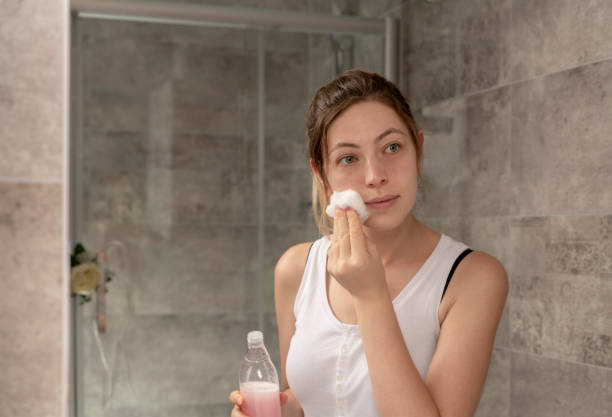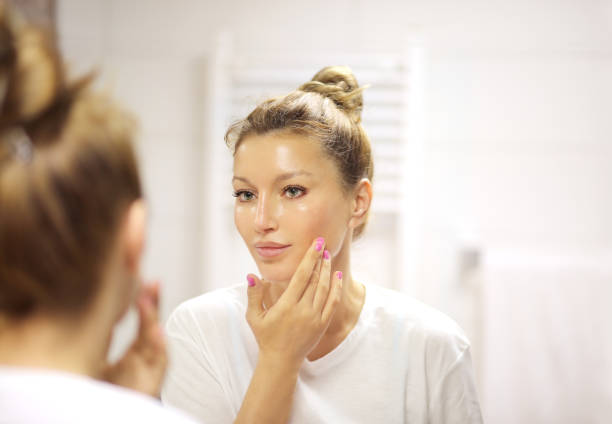Welcome to the world of skincare! In recent years, peptides have become incredibly popular in the beauty industry. What are peptides in skincare, and why are they so highly regarded? This section will introduce you to the concept of peptides in skincare and the numerous benefits they offer for your skin. With an array of peptide skincare products available, we'll also guide you on how to select the right product for your skincare routine. Are you ready to elevate your skincare game with peptide-infused products? Let's dive in!
Understanding Peptides: The Building Blocks of Youthful Skin
Peptides are not just another fad in skincare, but rather an essential component of any anti-aging routine. These short chains of amino acids serve as the building blocks of our skin, promoting collagen synthesis, improving elasticity, and reducing the appearance of fine lines and wrinkles.
The benefits of peptides in skincare are manifold. They act as biological messengers, communicating with our skin cells to trigger specific responses that address various skin issues. For instance, some peptides stimulate fibroblasts, the cells involved in producing collagen, while others promote the healing of damaged skin.
Peptides are also highly effective in reducing inflammation and improving skin moisture retention, making them an excellent choice for those with dry or sensitive skin. Their small molecular weight allows them to penetrate the skin more effectively, maximizing their benefits.
When it comes to anti-aging skincare, peptides are a game-changer. They help to combat the loss of collagen and elastin that occurs as we age, resulting in smoother, firmer skin with improved texture.
The Role of Peptides in Anti-Aging Skincare
Peptides play a critical role in anti-aging skincare by promoting collagen production and improving skin elasticity. Collagen provides structural support to our skin, ensuring it remains firm and supple. However, as we age, the production of collagen and elastin slows down, resulting in the formation of fine lines and wrinkles.
Peptides can help to counteract this process by stimulating collagen synthesis and improving skin elasticity. They work by signaling to our skin cells to produce more collagen, which in turn leads to firmer, smoother skin with a more youthful appearance.
Moreover, peptides can help to reduce the appearance of fine lines and wrinkles by relaxing facial muscles and promoting skin regeneration. They can also improve skin texture and tone, leaving your complexion looking radiant and refreshed.
Overall, peptides are a must-have in any anti-aging skincare routine. Their numerous benefits, combined with their safety and efficacy, make them a reliable option for achieving youthful, radiant skin.
How Do Peptides Work in Skincare?
Peptides work in skincare by penetrating the skin and communicating with cells, triggering specific responses that address various skin concerns. They act as messengers, signaling cells to produce more collagen, elastin, and other vital proteins that keep the skin healthy and youthful. When used in skincare formulations, peptides can provide several benefits, including:
- Reducing the appearance of fine lines and wrinkles;
- Improving skin elasticity and firmness;
- Boosting hydration levels;
- Stimulating cellular repair and regeneration;
- Reducing inflammation and redness;
- Regulating sebum production.
Peptides work by mimicking the natural peptides found in the skin, which act as messengers to stimulate cell communication. When applied topically, peptides can penetrate the skin barrier and interact with receptors on the surface of skin cells. This interaction triggers a cascade of events that leads to increased collagen production, improved skin texture, and enhanced overall skin health.
The effectiveness of peptides in skincare depends on their molecular size and structure. Peptides with a larger molecular size, such as signal peptides, can penetrate deeper into the skin and interact with structural proteins like collagen and elastin. Smaller peptides, such as neuropeptides, work more on the surface of the skin and can help reduce inflammation and promote healing.
How Do Different Peptides Work in Skincare?
There are various types of peptides used in skincare, each with unique properties and benefits. Here are a few examples:
| Type of Peptide | Function in Skincare |
|---|---|
| Signal Peptides | Stimulate collagen production and skin regeneration. |
| Copper Peptides | Antioxidant and anti-inflammatory properties that promote healing and skin renewal. |
| Neuropeptides | Reduce muscle contractions and promote relaxation of facial muscles, reducing the appearance of wrinkles. |
Understanding the different types of peptides and their functions can help you choose the right peptide skincare products for your skin concerns. When selecting a peptide product, it's important to consider your skin type and specific needs. A qualified skincare professional can assist with selecting the best peptide-based products for your skincare routine.
Different Types of Peptides for Skin
Peptides come in various types, with each having unique functions and benefits for the skin. By understanding the different types of peptides, you can choose the right skincare products that address your specific skin concerns. Here are some of the most commonly used types of peptides in skincare:
| Type of Peptide | Function |
|---|---|
| Signal peptides | These peptides stimulate collagen production, improving skin elasticity and firmness. |
| Copper peptides | With antioxidant properties, these peptides promote skin healing and reduce inflammation, making them ideal for sensitive and acne-prone skin. |
| Neuropeptides | These peptides target the deeper layers of the skin to reduce the appearance of fine lines and wrinkles, while also promoting skin hydration. |
| Carrier peptides | These peptides help deliver other active ingredients deeper into the skin, enhancing their effectiveness. |
Other types of peptides used in skincare include enzyme-inhibitor peptides, which help reduce dark circles and puffiness around the eyes, and neurotransmitter peptides, which aid in relaxing the facial muscles to prevent the formation of fine lines and wrinkles.
Choosing the Right Peptides for Your Skin
When selecting peptide skincare products, it's important to choose the right type of peptide for your skin concerns. Copper peptides, for instance, are ideal for those with sensitive, acne-prone skin, while neuropeptides work best for anti-aging concerns. Consider consulting a skincare professional to determine the best type of peptide for your skin.
If you're like most people, when you hear the word "peptide," you probably think of proteins. Peptides are, in fact, small chains of amino acids that are the building blocks of proteins. But peptides aren't just found in the body; they're also found in skin care products.
How do peptides work in skincare?
Peptides are thought to work in skincare by signaling to the skin that there's been an injury, which then triggers the production of collagen and elastin. By increasing the level of collagen and elastin in the skin, peptides can help to reduce the appearance of fine lines and wrinkles, as well as improve skin firmness.
Types of peptides for skin
There are many different types of peptides that can be found in skincare products, and the type of peptide that's right for you will depend on your particular skin concerns. For example, if you're concerned about fine lines and wrinkles, you might want to look for a product that contains a peptide known as argireline. If you're concerned about sagging skin, you might want to look for a product that contains a peptide known as SNAP-8. And if you're concerned about uneven skin tone, you might want to look for a product that contains a peptide known as Matrixyl.
Peptides for acne-prone skin
If you have acne-prone skin, you might be wondering if peptides can help to clear up your skin. Peptides are thought to be helpful for acne-prone skin because they can help to reduce inflammation and improve skin healing. In addition, peptides are believed to help to regulate the production of oil in the skin, which can help to reduce the buildup of oil that can lead to acne breakouts.
If you have sensitive, acne-prone skin, you might want to consult a skincare professional to determine the best type of peptide for your skin. And if you're using a topical peptide product, be sure to use it as directed and to monitor your skin for any adverse reactions.
Peptide Creams for Skincare
If you're looking to enhance your skincare routine, peptide creams may be just what you need. These creams are formulated with peptides, which stimulate collagen production, reduce fine lines and wrinkles, and improve skin texture.
When selecting a peptide cream, look for ones that contain a high concentration of peptides and are free from harsh chemicals and irritants. Peptide creams can be applied in the morning and/or evening after cleansing and toning your skin. Simply apply a small amount to your face and neck and gently massage in.
It's important to note that peptide creams are not a magic solution for all skin concerns. They work best when used as part of a holistic skincare routine that includes regular exfoliation, hydration, and sun protection.
Some popular peptide creams for skincare include:
| Product Name | Benefits |
|---|---|
| The Ordinary "Buffet" Peptide Serum | Reduces the appearance of fine lines and wrinkles |
| Perricone MD Neuropeptide Firming Moisturizer | Improves skin elasticity and firmness |
| Paula's Choice Peptide Booster | Improves skin texture and hydration |
Remember, consistency is key when using peptide creams. Incorporate them into your daily skincare routine and be patient – it may take some time to see the full benefits of these powerful peptides.
Peptide Serums for Skincare
If you're looking for a concentrated dose of peptides to supercharge your skincare routine, then peptide serums are an excellent choice. These formulations are specifically designed to penetrate deep into the skin and deliver a high concentration of peptides to target specific skin concerns.
The benefits of using peptide serums are many. They help stimulate collagen production, improve skin elasticity, and reduce the appearance of fine lines and wrinkles. They also promote a more youthful complexion and help to even out skin tone and texture.
When incorporating peptide serums into your skincare routine, it's important to follow the manufacturer's instructions carefully. Typically, peptide serums should be applied after cleansing and toning, but before moisturizing. Use a dropper to dispense the serum onto your fingertips, then gently massage it into your skin using upward strokes.
When selecting a peptide serum, look for products that contain a high concentration of peptides and are free from potentially harmful additives. It's also important to choose a serum that's appropriate for your skin type and specific concerns. For example, if you have dry skin, look for a peptide serum that's formulated with hydrating ingredients like hyaluronic acid.
Overall, peptide serums are a powerful addition to any skincare routine. With their ability to deliver a concentrated dose of peptides deep into the skin, they're an excellent way to target specific skin concerns and promote a more youthful, radiant complexion.
Peptides for Acne-Prone Skin
Peptides are not only useful for addressing signs of aging. They also offer benefits for those with acne-prone skin. Peptides can help to regulate sebum production, reduce inflammation, and promote skin healing.
Acne-prone skin is often characterized by overactive sebaceous glands that produce excess sebum, leading to clogged pores and breakouts. Peptides can help to control sebum production by regulating the activity of sebocytes, the cells that produce sebum. This can lead to fewer breakouts and clearer skin.
Peptides can also help reduce inflammation, a key factor in acne development. They can inhibit the production of pro-inflammatory cytokines, molecules that trigger inflammation, and promote the production of anti-inflammatory cytokines, which can help soothe inflamed skin.
Finally, peptides can promote skin healing. They can stimulate collagen production, which helps to repair damaged skin tissue and promote a healthy skin barrier. This can help to prevent future breakouts by providing a stronger, more resilient skin surface.
If you have acne-prone skin, consider incorporating peptide skincare products into your routine. Look for formulations that contain peptides such as oligopeptide-10, which has been found to be particularly effective in reducing acne and promoting skin healing.
The Role of Peptides in Anti-Aging Skincare
As we age, our skin loses elasticity and firmness, resulting in fine lines, wrinkles, and other signs of aging. The good news is that peptides can help address these concerns and promote a more youthful complexion.
Peptides are known for their ability to stimulate collagen production, which is crucial for maintaining skin elasticity and firmness. Collagen is a protein that provides structural support to our skin, keeping it plump and supple. By boosting collagen production, peptides can help reduce the appearance of fine lines and wrinkles, smooth out skin texture, and improve overall skin tone.
In addition to collagen stimulation, peptides also have antioxidant properties that help protect the skin against environmental stressors that can cause premature aging. By neutralizing free radicals and preventing oxidative damage, peptides can help maintain a healthy, youthful complexion.
The Different Types of Peptides for Anti-Aging Skincare
There are several types of peptides that are commonly used in anti-aging skincare products, each with its own unique benefits:
| Type of Peptide | Benefits |
|---|---|
| Palmitoyl pentapeptide-4 | Stimulates collagen production, reduces the appearance of fine lines and wrinkles |
| Acetyl hexapeptide-8 | Relaxes facial muscles, reducing the appearance of expression lines |
| Copper peptides | Stimulate cell turnover, improve skin texture and tone |
By choosing the right type of peptide for your skin concerns, you can maximize the benefits of anti-aging skincare.
Incorporating Peptides into Your Skincare Routine
To reap the benefits of peptides in anti-aging skincare, it's important to incorporate them into your daily routine. Peptide-rich creams and serums can be applied after cleansing and toning to promote collagen production and protect against environmental stressors.
When using peptide products, consistency is key. It may take several weeks or even months to see noticeable results, so it's important to be patient and stick with your routine.
Peptides can also work synergistically with other anti-aging ingredients, such as retinol and vitamin C, to enhance their efficacy. However, it's important to introduce new ingredients slowly and patch test first to avoid any adverse reactions.
With the right peptide skincare products and a consistent routine, you can harness the power of peptides to achieve a more youthful, radiant complexion.
Incorporating Peptides into Your Skincare Routine
If you're new to using peptides in your skincare routine, it's best to start slowly and gradually introduce them into your regimen. Peptides can be used in the form of creams, serums, or masks, and can be combined with other skincare ingredients for optimal results.
Step-by-Step Guide
Here's a step-by-step guide on how to incorporate peptides into your skincare routine:
- Cleanse your face with a gentle cleanser to remove dirt, oil, and makeup.
- Apply a toner to help balance your skin's pH level and prep it for the next steps.
- Apply a peptide serum to your face and neck, gently patting it into your skin.
- Allow the serum to fully absorb into your skin before applying any other products.
- Follow up with a moisturizer to help seal in the peptides and provide hydration to your skin.
- If using a peptide cream, apply it after your moisturizer and be sure to follow the product's specific instructions.
- Apply a sunscreen with at least SPF 30 to protect your skin from harmful UV rays.
Consistency is Key
For optimal results, it's important to use peptide skincare products consistently. Incorporate them into your daily skincare routine and use them as directed on the product label. Over time, your skin will start to reap the benefits of peptides, such as improved tone and texture, reduced fine lines and wrinkles, and a more youthful glow.
Choose the Right Peptide Products
Not all peptide skincare products are created equal, so it's important to choose high-quality products that suit your skin type and concerns. Look for products that contain a high concentration of peptides and are free from harmful ingredients like parabens and sulfates.
Additionally, it's important to patch test new peptide products before applying them to your entire face. Apply a small amount of the product to a discreet area of your skin, like your wrist or behind your ear, and wait 24-48 hours to ensure that you don't experience any adverse reactions.
Incorporating peptide skincare products into your routine can be a gamechanger for your skin. With a little patience and consistency, you can achieve a more youthful, radiant complexion.
Finding the Right Peptide Skincare Products
With so many peptide skincare products on the market, finding the right one can be overwhelming. Here are some tips to help you choose:
- Consider your skin type: Different peptides work best for different skin types, so it's essential to choose a product that caters to your skin concerns.
- Read the label: Look for products that contain a high concentration of peptides, preferably listed towards the top of the ingredients list.
- Research the brand: Choose a reputable brand that uses high-quality, clinically tested peptides in their products.
- Check for additional beneficial ingredients: Peptides work best when combined with other complementary ingredients, so look for products that contain antioxidants, retinol, vitamin C or hyaluronic acid.
- Consider your budget: High-quality peptide skincare products may come with a hefty price tag, so it's essential to choose a product that suits your budget.
By following these tips, you can choose a peptide skincare product that best suits your skin type and concerns. Remember, consistent use of peptide skincare products can result in healthy, youthful-looking skin.
Enhancing Your Skincare Routine with Peptides
Peptides can work wonders for your skin, but to maximize their benefits, they need to be incorporated into a well-rounded skincare routine. To get the most out of your peptide products, follow these tips:
Cleanse
Start your routine by cleansing your skin thoroughly. This will ensure that any dirt, oil, and makeup are removed and your skin is ready to receive the benefits of your peptide products.
Tone
After cleansing, use a toner to balance your skin's pH levels and add an extra layer of hydration. Look for toners that contain hyaluronic acid, glycerin, or aloe vera, which work well with peptides.
Apply Peptide Serum
After toning, it's time to apply your peptide serum. Apply a small amount to your face and neck, gently massaging it in using upward motions. Allow the serum to fully absorb before moving on to the next step.
Apply Peptide Cream
Next, apply your peptide cream. Look for creams that also contain other beneficial ingredients, such as vitamins C and E, retinol, or niacinamide. These can work together with peptides to enhance their effects. Massage the cream into your skin until fully absorbed.
SPF Protection
Don't forget to protect your skin from harmful UV rays. Apply a broad-spectrum SPF 30 or higher sunscreen to your face and neck every day, even on cloudy days or when you're indoors.
Consistency is Key
For optimal results, it's important to use your peptide skincare products consistently. Incorporate them into your daily routine and use them as directed for at least a few weeks to start seeing improvements in your skin's texture, tone, and overall appearance.
By following these simple steps, you can ensure that your peptide products are effectively integrated into your skincare routine, helping you achieve beautiful, youthful-looking skin.
The Future of Peptides in Skincare
Peptides have gained significant popularity in the skincare industry, and it's no surprise that they will continue to play an essential role in the future. Scientists and researchers are actively exploring new peptide combinations and formulations that can enhance their efficacy even further.
Futuristic peptide skincare products are expected to target specific skin concerns, such as hyperpigmentation, dryness, and sensitivity. There will also be a focus on developing multi-benefit peptide products that cater to a range of skin concerns simultaneously.
Another trend in the future of peptide skincare is personalized formulations. Customized peptide skincare products will be formulated based on an individual's skin health and needs to deliver targeted results effectively.
As technology advances, we can expect to see more advanced delivery systems for peptides, such as nanotechnology and microencapsulation. These methods will help peptides penetrate the skin more effectively and provide longer-lasting benefits.
In conclusion, the future of peptides in skincare is bright, and we can expect to see more innovative and effective peptide skincare products in the market soon. If you're interested in unlocking the benefits of peptides in your skincare routine, it's crucial to stay updated on the latest research and developments in the industry.
Conclusion
Peptides are an important and versatile ingredient in skincare, offering a range of benefits for enhancing skin health, boosting collagen production, and addressing specific skin concerns. By understanding what peptides are and how they work, you can choose the right peptide skincare products to incorporate into your daily routine.
Unlocking the Power of Peptides in Skincare
Peptide skincare products, such as creams and serums, can be a valuable addition to your beauty regimen, helping to reduce the appearance of fine lines and wrinkles, improve skin texture, and promote a more youthful complexion. Whether you have acne-prone skin or are looking for anti-aging benefits, there's a peptide skincare product out there that can help.
The Future of Peptides in Skincare
The potential of peptides in skincare is vast, as ongoing research and development continue to expand our understanding of how peptides work and their benefits for skin health. In the future, we can expect to see even more innovative peptide skincare products that harness the power of peptides to promote optimal skin health and beauty.
Overall, peptides are an exciting and promising ingredient in skincare that offer real, visible results. By incorporating peptide skincare products into your daily routine, you can unlock the beauty-boosting power of peptides and achieve a youthful, radiant complexion.
 A World Shopping
A World Shopping





0 Comments